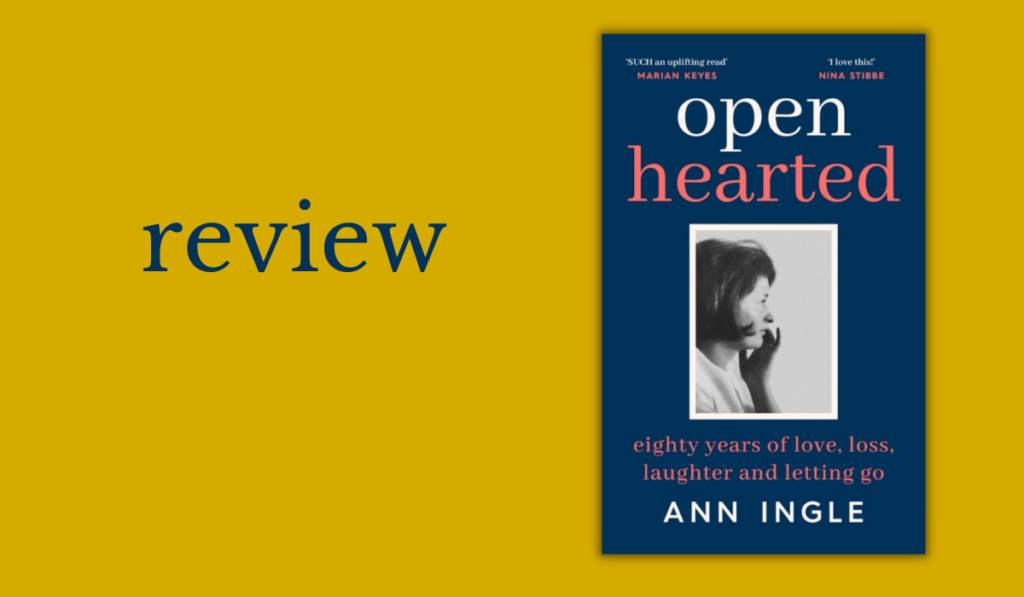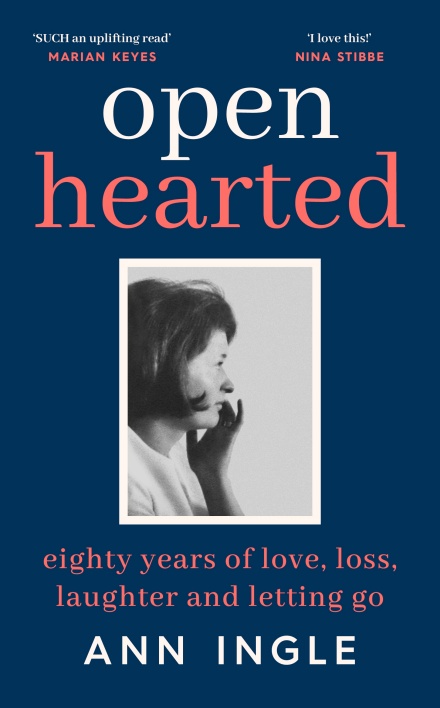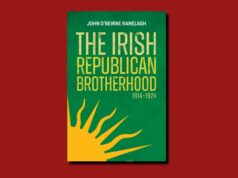
Openhearted|Ann Ingle|Penguin Sandycove|£14.99|ISBN:9781844885718
An extraordinary life unfolding in a relatable, down-to-earth memoir.
—Susan McKeever on Ann Ingle’s Openhearted, shortlisted for the RTÉ Audience Choice Award in the An Post Irish Book Awards.
by Susan McKeever
I’m sitting in one of my favourite cafés with a flat white, listening to a warm, vital and engaging eighty-one-year-old woman tell me stories of her long and varied life. Some of her stories are heart-warming; some are hilarious; others are harrowing. One thing is clear: the life she has led was never dull.
This is what reading Ann Ingle’s memoir – and first book – feels like. When Ann attended a memoir-writing course in the Irish Writers Centre the teacher told her that she ‘had a voice’. But her head was asking, ‘Why do you think anyone will be interested in your life and what you have to say about anything?’ At her mature age, she has experienced the ‘invisibility cloak’ and the hurtful assumptions many make about older people being somehow incapable of speaking for themselves. But undaunted, she dived in.
Twenty-year-old Londoner
We learn about a twenty-year-old Londoner hoping to start teacher training who fell head over heels for an Irish curly haired charmer called Paddy while on holiday in Cornwall.
Thus began a helter-skelter adventure of utter besottedness with a man who was not exactly as he seemed.
As ‘there was more coitus than interruptus’ going on in their sexual relations, Ann became pregnant and they were forced into a shotgun wedding seven months later. In the church to fill in some forms, it came out that Paddy’s real name was Peter Ingle. Nevertheless, the wedding proceeded and they moved to Ireland.
Moving to Ireland
Here, Ann entered a mystifying world where she discovered that the English were responsible for 800 years of Irish hardship and woe, the lamb was baa-ing outside the butcher’s even as she asked the bemused server for the New Zealand variety, and her tee-total in-laws had no brandy with which to light the Christmas pudding. She also couldn’t find a croissant or Lurpak butter anywhere and had to go into Bewley’s in Grafton Street to get a decent cup of coffee.
The couple eventually settled in Sandymount, and Ann embraced Irish life to the full, becoming a citizen in 1977 and making friends of all ages, from all walks of life.
Ann and Peter lived happily together for a time and had eight children, but it wasn’t all sunshine and rainbows: Peter’s work as a taxi driver was erratic and he found it hard to hold down a job, often decamping to the pub in the middle of a working day.

Tragedy
Peter increasingly struggled with mental health issues and it is painful to read how his personality changed, along with the harrowing accounts of his mismanagement at the hands of the blunt mental healthcare services available at the time. He tragically died in 1980 at the age of forty and Ann made a living from her cottage industry of typing anything from authors’ manuscripts to solicitors’ documents – she was a wizard on the keyboard with 100 words a minute. That, along with her Widows’ Pension and the Children’s Allowance enabled her to raise eight, successful, independent-minded children – one of the younger ones being ‘the journalist daughter’, Róisín Ingle.
Page-turner
This is not a linear memoir, which makes it more of a page-turner, as we never really know what is coming next. It is arranged as a series of thematic essays, loosely based around subjects such as mental breakdown, the use of social media, living through the pandemic, sharing a house, and sex (alluringly titled ‘smelling of scones’).
The sex chapter, when it arrives, is as frank, honest and down to earth as we’d expect at this stage.
The vibrator she alludes to ‘proved useful over the years’ but when she grew jaded with it she ‘wrapped it up in newspaper and put it the bin at the bus stop’. Although we don’t find everything out chronologically, we can live without knowing, for instance, who Ann’s ‘housemates’ are until it’s revealed later in the book.
The book is peppered with interesting quotes, very personal letters, explanatory footnotes, poetry and song lyrics, and tips such as a keyboard shortcut to enlarge text on the screen for those with bad eyesight. I learnt things I never knew: did you know that attempting to take your own life was illegal in Ireland until 1993 and was grounds for imprisonment?
The flat white is now finished and I’ve thoroughly enjoyed the chat I’ve had with Ann Ingle.

Susan McKeever is an editor, writer and ghostwriter for several Irish and international publishers and authors. She works from her home in the red-brick heart of Dublin’s Portobello. @MckeeverSusan, susanmckeever.biz











